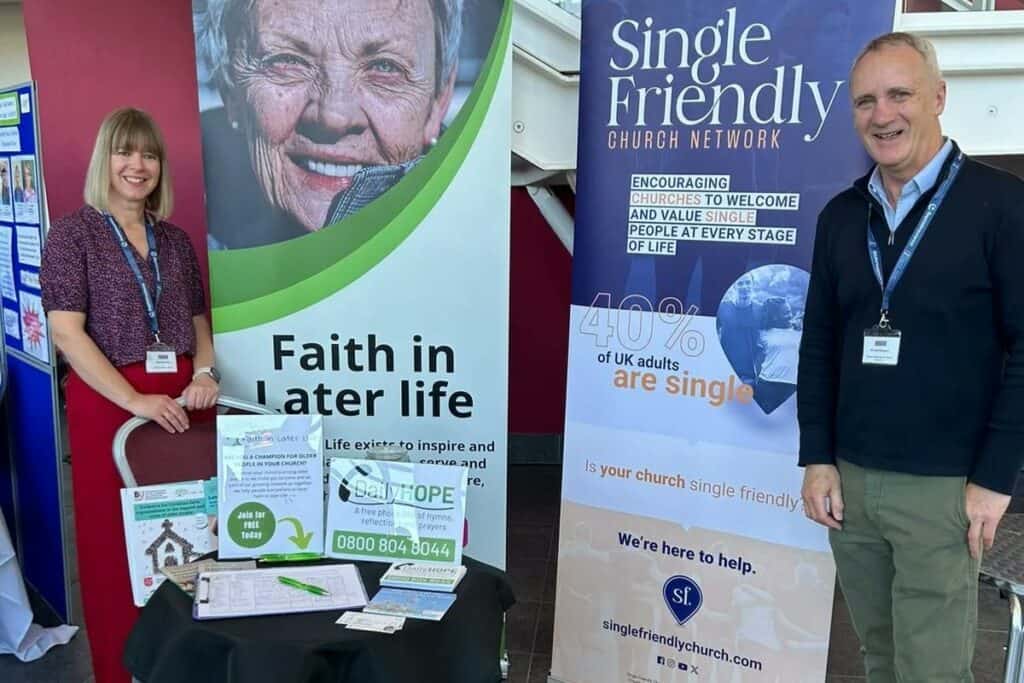Ending Well as a Single Christian

Author: Single Friendly Church Network
Single Friendly Church Network is a charity which encourages churches to welcome and value single people at every stage of life. This includes those who have never married, people who are divorced, single parents and those who are widowed. Our CEO, Alexandra Drew, recently met the charity’s Exceutive Director, Mike Simpson, and asked him to share more about their work with our network.
We recently conducted a survey about the tricky issue of how churches respond when a single Christian passes on. The topic raised lots of issues but also many positive suggestions. Perhaps you also have thoughts on how churches should help single Christians to prepare for their passing. We would love to hear from you, especially if your church has a loving and helpful approach to this issue.
What happens when single Christians pass on?
When single Christians pass on, their friends usually hope to be able mourn them by being part of a Christian funeral honouring their life, faith and friendship.
But friends can be in for a rude awakening. It is usually the family who are given responsibility for the funeral. They may not have been very close to the person who died, or unaware or uninterested in their life of faith. A private ceremony with little or no Church input – sometimes with only immediate family present – can often be the result. The faith ‘family’ and close Christian friends can find themselves shut out – attending a ceremony which does not celebrate the Christian life and journey of their friend who has died, or perhaps they are not even invited.
People shared many different experiences including the following:
Pat told us, “Some years ago I attended a humanist funeral for my friend and neighbour who was a lovely Christian. I was horrified at how cold and impersonal it was. At the end ‘All things bright and beautiful’ was played as I had told the family it was her favourite hymn. There was no acknowledgment of her Christian faith and the family did not involve the church although I had offered for the church to host the service and find a minister (we had no minister at the time).”
One person, who was happy for us to share her story anonymously wrote, “I was at a funeral yesterday of a very popular and well known widower, he had been a licensee living and working in the area for many, many years, so widely known. The service was nominally Christian. The funeral hadn’t been advertised well. I didn’t see friends and acquaintances there, only immediate family and a video link for Australian family. As more distant family I felt out of place, like I shouldn’t have been there (after travelling 100 miles to get there I may add). It’s not just the funeral content that needs to be considered but also letting people know of the death through as many channels as possible. This one relied on Facebook only, it wasn’t adequate, the gentleman who died wasn’t an avid Facebook user.”.
Alison was upbeat about her experience. She told us, “I am estranged from my only sister and her adult children. I am very fortunate as friends have stepped in as next of kin and have Power of Attorney and I have given them details of my funeral plan. I have paid for it in advance and planned my funeral service in the hope to lighten their load.”
Another anonymous contributor said, they were “very sad that the family of a good friend organised a direct cremation with no ceremony or fuss despite the friend being a devout church goer. They denied us the chance to say goodbye and give her a fitting ceremony reflecting her amazing faith. They just weren’t interested”.
A loving and practical response
As part of the Single Friendly Church Network survey we asked for positive suggestions and we were delighted to receive many contributions. We thought we would share some of these including a list of practical tips from one contributor.
Susie shared what she thought would be the ideal way for people to prepare. “They have a power of attorney in place before mental capacity is compromised, their end-of-life care arrangements and funeral wishes are documented, and they leave copies of their wishes with both family, and friends. It would be particularly useful if one of their friends was someone from their church who could help with the practicalities of complying with their wishes for their funeral”.
Lou said that churches should “encourage singles who have no nearby relatives to consider providing details to someone at church of their next of kin contact details, and to share with their next of kin their funeral wishes”.
Alison made a more general point. She said, “Generally speaking, I think we need to be talking more about death. And have more spaces, in church, where the nitty gritty of these end-of-life matters can be shared.”
Pat wanted churches to “speak to people of all ages. Arrange workshops on planning. Make sure end of life issues are discussed generally as part of Christian life.”
Danielle agreed. “Talk about it! Talk about options – living funerals. Do you plan the service yourself before you die. Give people options of what is possible. I’d hate for people to wear black at my funeral. I’ve never had a wedding/ baby shower etc etc so I want people to wear nice clothes/ bright colours. Maybe even a fascinator!”
Michael said churches should “start by doing the Single Friendly Church Network audit, recognising who is single, doing things better and providing support generally. Then, Bible studies, talks on practical aspects of planning (Wills, Powers of Attorney). Speakers on relevant topics. Suggesting books to read (not just Christian texts – eg With The End in Mind, Kathryn Mannix). Offering help with talking through questions and practical steps. List of local solicitors who do Wills and Trusts. Maybe church members can offer to be attorneys / executors where needed.”
Another person had this very practical advice:
• “Encourage us to write our own eulogy or at least notes of key events/activities, nobody local will know of our earlier life (even younger family don’t know) but especially if you are relying on friends
• Consider the style of service we would like and document it; celebration or traditional, hymns or songs, readings and favourite readings (being able to speak ‘from the grave’ so to speak about our faith is so powerful and makes for a more personal funeral)
• Make decisions over burial or cremation, where to bury us or scatter ashes etc, find any grave certificates already held and keep with our wish list for the service. Consider a funeral plan if the type of coffin, hearse, eco options etc are really important or if family funds are limited
• Let your Next of Kin know which church you attend and therefore where the funeral should be held
• Ensure your Next of Kin know where your will is lodged and any house deeds, valuable jewellery etc, eg solicitors, safe deposit boxes. Having cleared the house of a disorganised hoarder, keep your important documents together (financial, passport, will, grave certificate etc) where they can easily be found. File things together and shred old statements/accounts etc regularly, it makes life so much easier for your next of kin!”
Beth said, “My church is a young church in London so we don’t do anything, but my grandmother’s church put on a course about end of life preparations and helped people plan their funerals. It was particularly important for those who were widowed with family who didn’t share their faith. The group was inspired by one lady who had recently passed and had planned the most wonderful funeral as a celebration of her life. It was also quite evangelistic and there were hundreds of people she had befriended throughout her life who attended.”
If you have experiences or thoughts about these issues we would love to hear from you.
You can read more about the work of Single Friendly Church Network on their website or contact them here.
